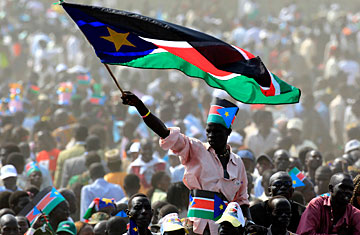
A man waves South Sudan's national flag as he attends the Independence Day celebrations in the capital Juba, July 9, 2011.
Ten minutes before midnight in an unlit side street in Juba on July 8, 18-year-old Akot Bol shuffles through a jubilant crowd swelling by the minute in anticipation. Soon, their moment comes. As the clock officially strikes July 9, packed cars of screaming youth race through the streets, weaving in and out of parading mobs chanting patriotic slogans and waving the South Sudanese flag. Bol, who lost his father during Sudan's 21-year civil war, was ecstatic. "I'm so happy. Today we have finally separated from the Arabs."
That party carried over into the waking hours, albeit a lot more stiffly, as African heads of states and delegates from the around the world converged to welcome the infant nation into the fold. After 50 years of on-and-off armed struggle, 2 million lives lost, 4 million refugees, and a testy six-year peace period capped by a skeptic-defying peaceful referendum for secession in January, South Sudan's day of national liberation finally arrived. The decades of old built-up frustration fused with a new swagger of patriotic pride, as tens of thousands crowded for the independence ceremony chanting "We will never surrender" and "Bye bye Khartoum" — the capital of the country they were now separating from. Speaking at the festivities, South Sudan's leader was both blunt and diplomatic. "We have been bombed, maimed, enslaved, and treated worse than a refugee in our own country," proclaimed Salva Kiir after being sworn is as the nation's first president. "We have to forgive, although we will not forget."
So ends one long chapter of Western engagement in Sudan, and, in frustrating fashion, so begins another. Once Africa's largest nation in terms of square mileage, Sudan is being torn apart by a myriad of unending crises. Splitting the huge territory into two countries has forestalled more north-south conflict for now, but it has hardly solved the situation. South Sudan's core grievances persist behind in the north, where other marginalized non-Arab communities outside Sudan's elite Khartoum bubble have taken arms as well. The conflict in Darfur festers. The war in the oil-rich border state South Kordofan re-erupted last month, putting the wartime southern rebel allies in the Nuba Mountains back in the crosshairs; and the region of Blue Nile, strategically aligned with South Kordofan, could be next. Meanwhile, the hard liners within President Omar al-Bashir's Khartoum regime seem to be winning an internal policy debate about how to respond to the nation's partition: mainly, by cracking down on all leftover dissent.
The South, despite the rosy optimism of the day, does not look much better. The new nation is starting from a base of near-zero — it lacks roads, schools, doctors, or qualified civil servants. What it doesn't lack is weapons, unemployed young men, and tribal divisions. It also does have real economic potential — it pumps billions of dollars of oil annually and more exploration is on the way, and the country has vast tracts of rich farmland. But wider development will be impossible if the rampant insecurity that killed 1,800 people so far this year is not curbed. And, politically, the ex-rebel rulers seem to be taking after their former masters in the north. On July 7, eight opposition members, including the leader of a small opposition bloc in parliament, were arrested and beaten. "The government has to learn that it is okay to have opposition," U.S. Special Envoy to Sudan, Princeton Lyman, told TIME in Juba. "They've got to leave that door open."
It would be one thing if the two Sudans could simply address their internal issues on their own. But, instead, their two fates are for now inextricably tied. "Both countries are fragile and will remain vulnerable until they reach the kind of agreement that allows them to work together," says Sen. John Kerry, chair of the foreign relations committee. The north and south need to strike a deal to pump its oil through the north, but that remains elusive. The north is likely supporting destabilizing rebel militias in the south; the south has military ties to the rebels in the north. The disputed border district of Abyei remains unresolved. And South Sudan says it will not walk away from the many northerners who sided with them during the war. "I want to assure the people of Abyei, Darfur, Blue Nile, and South Kordofan, that we have not forgotten you," pledged Kiir ominously. The African Union-mediated north-south talks in Ethiopian capital Addis Ababa have stalled and could be on the verge of falling apart. Kiir says he will never take his people back to war. But what happens now, no one knows. Both sides have re-positioned troops along the border, and with independence in hand, the south no longer has to play nice when provoked.
There are precedents: East Timor, in 2002, and Eritrea, in 1993, both of which chose independence under similar circumstances after long and brutal armed struggles. In East Timor's case, the result has been a slogging progression: democracy has held and development is beginning. In Eritrea, another scenario unfolded: a weak nation gripped by a ruthless regime, and more war. In South Sudan, the worst case scenarios are obvious and horrifying; the best case is much more difficult to delineate, and much murkier. Its sovereignty secured, South Sudan's newest challenge might be its hardest yet: figuring out what freedom means.
